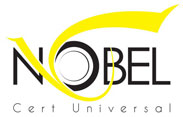ISO 13485:2003 specifies requirements for a quality management system where an organization needs to demonstrate its ability to provide medical devices and related services that consistently meet customer requirements and regulatory requirements applicable to medical devices and related services. The primary objective of ISO 13485:2003 is to facilitate harmonized medical device regulatory requirements for quality […]

NOBEL Standards
ISO/IEC 20000-1:2011 is a service management system (SMS) standard. It specifies requirements for the service provider to plan, establish, implement, operate, monitor, review, maintain and improve an SMS. The requirements include the design, transition, delivery and improvement of services to fulfil agreed service requirements. ISO/IEC 20000-1:2011 can be used by: an organization seeking services from […]
ISO/IEC 15408-1:2009 establishes the general concepts and principles of IT security evaluation and specifies the general model of evaluation given by various parts of ISO/IEC 15408 which in its entirety is meant to be used as the basis for evaluation of security properties of IT products. It provides an overview of all parts of ISO/IEC […]
For standardized colour comparison, it is necessary to have an assessor with normal colour vision and to have reproducible illumination and viewing conditions. It is usual to match colours to a standard in daylight, but the spectral composition of daylight varies considerably. Although it is difficult to control precisely the spectral distribution of artificial light […]
Whilst there are numerous management tools and techniques commonly used, the EFQM Excellence Model provides an holistic view of the organisation and it can be used to determine how these different methods fit together and complement each other. The Model can therefore be used in conjunction with any number of these tools, based on the […]
This International Standard provides guidance to support the achievement of sustained success for any organization in a complex, demanding, and ever-changing environment, by a quality management approach. The sustained success of an organization is achieved by its ability to meet the needs and expectations of its customers and other interested parties, over the long term […]
The Quality management principles underlying the ISO 9000 family of standards (of which the ISO 10000 series form a part) emphasize the importance of human resource management and the need for appropriate training. They recognize that customers are likely to both respect and value an organization’s commitment to its human resources and its ability to demonstrate the strategy used […]
ISO 14470:2011, Food irradiation – Requirements for the development, validation and routine control of the process of irradiation using ionizing radiation for the treatment of food, not only provides requirements, but also guidance for meeting them. Food irradiation is the process where food is exposed to ionizing radiation in order to improve its safety and quality. […]
BS ISO 37101 is the first international standard on sustainable development in communities and cities. Among a range of sources, it draws on some content in BS 8904:2011 Guidance for community sustainable development. But whereas that standard is best suited to local, grass-roots organizations, this international standard has been developed to help city leaders create […]
ISO 13053-1:2011 describes a methodology for the business improvement methodology known as Six Sigma. The methodology typically comprises five phases: define, measure, analyse, improve and control (DMAIC). ISO 13053-1:2011 recommends the preferred or best practice for each of the phases of the DMAIC methodology used during the execution of a Six Sigma project. It also […]









